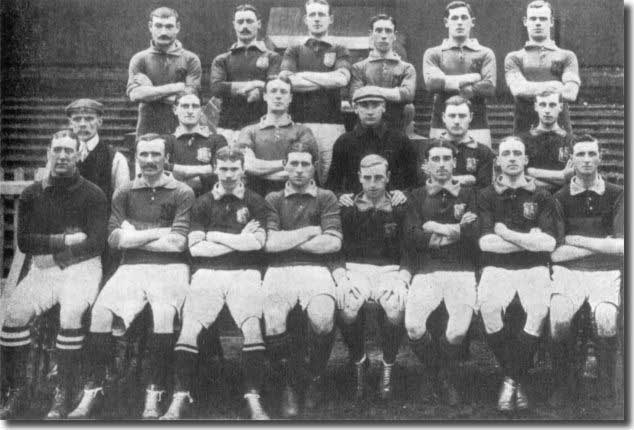 Part
2 - Results and table
Part
2 - Results and table
By the summer of 1907, the appetite for success of Leeds City's ambitious
board of directors had been thoroughly whetted by two years of hard competition
in the Second Division of the Football League. They had fully expected
to taste early success after admission to the League in 1905. Chelsea
were elected at the same time as City, and secured promotion at the second
attempt, prompting envious thoughts in the West Riding. If the Southern
upstarts merited top-flight football, then the Peacocks deserved nothing
less.
A sixth place finish was as promising as much of their football in the
club's debut season, but their second campaign was disappointing, with
some mediocre performances and a lowly conclusion. The board, led by chairman
Norris Hepworth, expected better - promotion was the minimum target
for 1907/08, and many felt that even the championship should not be beyond
City.
The directors had poured money into the club from the start, and demanded
that secretary-manager Gilbert Gillies
deliver success this time around. The summer of 1907saw no let up in the
team building process as Elland Road welcomed another couple of costly
imports, Fred Croot and Tom Hynds.
21-year-old Croot, a dashing left winger of some renown, joined City
from Sheffield United on 3 May and went on to become one of the club's
most outstanding servants, making 218 League appearances over the twelve
years that followed. He possessed a gifted left foot and was noted for
his dangerous crosses, making him an ideal provider for centre-forward
Billy McLeod. Croot was just as likely, though, to cut in and shoot himself,
being one of the country's top scoring wide men.
Hynds was a mature and robust Scottish centre-half, cool, self-assured
and accurate with his passing. He began his top class career with Celtic,
but never became a first-team regular, going out on loan to a number of
clubs before moving permanently to Manchester City in 1902. He won a Second
Division championship medal a year later and added an FA Cup winners medal
in 1904 when City beat Bolton Wanderers at Crystal Palace with a goal
from the legendary Billy Meredith. Hynds was good enough to be picked
for an Anglo-Scots representative side that played against the Home Scots
in March 1905 but was suspended from football between June and December
1906 for his part in an illegal payments scandal before finishing the
season at Woolwich Arsenal. His experience at the highest level in both
England and Scotland made him an ideal choice as the new Leeds City captain.
The club also signed a couple of right-backs from Bolton Wanderers, Harry
Kay and William Bates, in an effort to find a regular partner for the
reliable Scot, David Murray. It was Kay who got the first opportunity
to stake his claim, partnering Murray in front of Harry Bromage, the omnipresent
custodian.
City had closed their previous campaign with
a strong burst of form, losing just two of their last eleven games, and
the Selection Committee kept faith 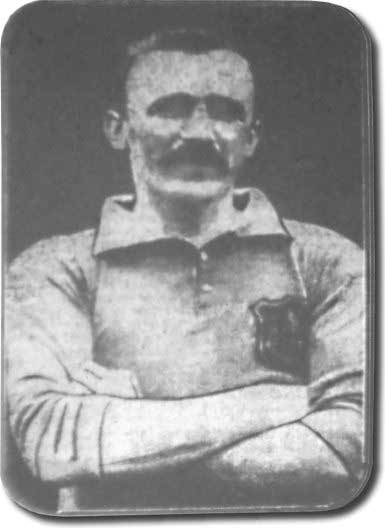 with
most of the men who had featured in that run when they determined their
choice to open the new season.
with
most of the men who had featured in that run when they determined their
choice to open the new season.
The half-back combination for the opening day saw Hynds partnered by
Tom Tompkins, a close season signing from junior club Denaby United, and
old hand James Henderson. Croot was the only change up front, coming in
to partner Fred Parnell, Bob Watson, Billy McLeod and Jack Lavery.
As the City eleven took the field in their usual strip of dark blue shirts
with old-gold trimming, white shorts and blue socks for the season's opener,
hopes were exceptionally high. Their first test came on 2 September at
home to Glossop, who had barely survived a year-long battle to avoid re-election,
securing their position only in the final week of the season. The Peacocks
looked forward to a soft curtain raiser to bolster their confidence for
what they hoped would be a successful campaign.
Sure enough, they emerged with a win, the 2-1 scoreline meaning that
for the first time in their short history the team had earned full points
from their opening fixture. However, they struggled against a Glossop
team that battled manfully and took a totally unexpected lead after half
an hour when Mackenzie, their centre-forward, gave them something to show
for a decent period of play.
In the second half, the debutant Croot turned the game City's way with
some excellent football, laying on both goals. First, he went on a sparkling
run down the left flank and pushed the ball inside for Lavery to beat
goalkeeper Tustin; later, his canny lob into the centre struck the bar,
dropping down for Watson to head the winning goal, though it was later
recorded as an own goal by the keeper.
The former Sheffield winger was the day's star turn, as noted in the
Leeds Mercury: 'In Croot, the club have obtained a really good
man for the outside-left position. He pleased the crowd with his splendid
turn of speed and the accuracy of his centres. He knows how to play to
his inside man.'
The paper was less impressed with Croot's teammates: 'Parnell and Watson
have not yet got into their best form … the forward line … playing somewhat
raggedly … Tom Hynds … acted as captain yesterday, and although he has
a fairly good control of the ball he struck one as being somewhat slow.
No doubt, after a little more training, he will improve in this respect.
'Henderson was as warlike as ever, and he covered a lot of ground, doing
a great deal of useful work. Tompkins, who played in the right-half position,
did not show as good form as in practice games. He had some difficulty
in keeping his feet on the slippery turf, and occasionally might with
advantage have gone for the ball instead of waiting for it to come to
him.
'With regard to the backs, Murray and Kay came out of trying situations
in clever fashion. Yet they were not steady enough to inspire one with
confidence. Murray was the better of the pair, and kicked with strength
and tackled with certainty. Bromage in goal kept out some rasping shots,
but he left his charge two or three times riskily, and a little coolness
on the part of the attackers might have ended in disaster.'
Nevertheless, a win was a win and Croot's sparkling display hinted at
some enjoyable moments to come in a season that brimmed over with rich
potential.
Tom Hynds gave a better performance in the match that followed at Leicester
Fosse, with the Mercury's Wanderer noting, 'Hynds was undoubtedly
the pick. The manner in which he engineered the ball and placed it was
exceedingly clever, and it is no exaggeration to say that he was the mainstay
of the team. As a captain, too, he was exceedingly useful, and kept his
men together cleverly.'
back to top
City played well and should have won - there was no score at the interval
but the Peacocks fought back after falling behind to take a 2-1 lead with
goals from Watson and McLeod. It looked like they would hold out to take
both points, but Leicester luckily equalised in the final minute when
Harry Bromage allowed a soft shot from Middleton to slip through his fingers.
The City players could have been excused for letting the disappointment
of the dropped point affect their play, but two days later they bounced
back in astonishing style with a breathtaking 5-2 victory at Elland Road
against Clapton Orient.
In March 1906, the Londoners had shipped six goals against City, and
while the winning margin this time was a mere three goals, the play was
every bit as one sided. Clapton keeper Whittaker suffered a nightmare,
surrendering goals to Watson and Croot in the first ten minutes with some
schoolboy errors. Further efforts by Watson and Lavery built up a four
goal lead by the interval before inside-forward Oliver pulled a couple
of goals back for Orient in the second half. Stung by this, City rallied
and Lavery scored his second and the Peacocks' fifth in the last few minutes
to leave Leeds impressive winners. The victory saw the club sitting for
the first time atop the Division Two table.
It was early days as yet, but progress was heartening, as noted in the
Mercury by Flaneur: 'Leeds City may not maintain their present
high position in the Second Division of the League; they will, in the
ordinary course, suffer their defeats and disappointments; but they have,
I think, a team capable of achieving a greater measure of success than
fell to the lot of the club last season. Weak places have been strengthened
by the acquisition of Tom Hynds and Croot, and, though one must keep an
open mind as to the possibilities of Kay and Tompkins, the whole team
seems better balanced than was the case a year ago.'
| |
Top of Division Two - 14 September 1907 |
| |
Pos
|
|
P
|
W
|
D
|
L
|
F
|
A
|
Pts
|
| |
1st
|
Leeds
City |
4
|
3
|
1
|
0
|
12
|
7
|
7
|
| |
2nd
|
Hull
City |
4
|
3
|
0
|
1
|
5
|
2
|
6
|
| |
3rd
|
Gainsboro'
Trinity |
3
|
2
|
1
|
0
|
6
|
2
|
5
|
| |
4th
|
Clapton
Orient |
5
|
2
|
1
|
2
|
8
|
12
|
5
|
| |
5th
|
Fulham |
3
|
2
|
0
|
1
|
7
|
2
|
4
|
| |
6th
|
West
Brom Albion |
3
|
2
|
0
|
1
|
8
|
3
|
4
|
| |
7th
|
Derby
County |
3
|
2
|
0
|
1
|
8
|
3
|
4
|
| |
8th
|
Oldham
Athletic |
2
|
2
|
0
|
0
|
5
|
2
|
4
|
| |
|
|
|
|
|
|
|
|
|
Their leadership of the table was reinforced by a hotly contested 3-2
victory at Blackpool on September 14. The Seasiders equalised twice after
first Bob Watson and then John Lavery gave City the lead. Fred Croot produced
another sparkling performance and laid on a late winner for Fred Parnell
with a dangerous cross into the goal area.
City were rapidly becoming a force to be reckoned with, carrying all
before them on the back of Croot's penetration. The winger was inspiring
the men around him.
The opening run of games was just what the doctor had ordered. Many of
the clubs below City had games in hand, but this did nothing to quell
the joy of everyone associated with Elland Road - the Peacocks finally
seemed to be living up to the expectations of Gilbert Gillies and the
club's directors.
They were given food for thought a week later, though, when City's unbeaten
run was rudely ended by a 2-1 defeat at Stoke on September 21.
The first four games had seen the same eleven on duty, but now a change
was forced by the absence of young Tom Tompkins, missing through an injury
sustained at Blackpool. 21-year-old Jimmy Thorpe thus made his debut,
and he did well enough, proving himself, according to Wanderer in the
Leeds Mercury, "a very capable half-back. He is very cool, and uses good
judgement when passing the ball."
His colleagues, though, were not displaying the same confidence, as Wanderer
commented: 'Leeds City were very disappointing. They did not infuse into
their play the dash which has characterised their previous exhibitions.
They were too slow on the ball, and in this respect gave their opponents
a great advantage. The most disappointing feature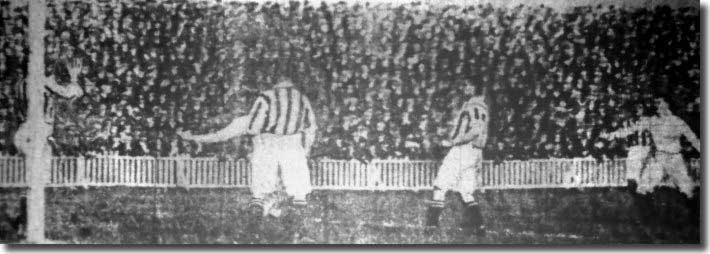 of the game was the poor display on the right wing by Parnell and Watson,
who generally prove so effective. True, Parnell scored the only goal -
the result of a neat bit of work; but with this exception, his play was
far from brilliant. Watson spoilt himself by sticking to the ball too
much. Time after time he would attempt to dribble past several of his
opponents when one of his colleagues was waiting for the ball. The back
division, too, was not as sound as one could have wished for.'
of the game was the poor display on the right wing by Parnell and Watson,
who generally prove so effective. True, Parnell scored the only goal -
the result of a neat bit of work; but with this exception, his play was
far from brilliant. Watson spoilt himself by sticking to the ball too
much. Time after time he would attempt to dribble past several of his
opponents when one of his colleagues was waiting for the ball. The back
division, too, was not as sound as one could have wished for.'
The Potters opened the scoring after 15 minutes, but City missed a number
of chances before Parnell equalised just prior to the interval. Stoke
made their dominance pay when Williams fired home from 25 yards, and they
always looked the better side, benefiting from the Peacocks' lacklustre
football.
The Stoke reverse looked to be a mere blip, though, when
Billy McLeod opened the scoring a week later, after just three minutes
against a strong West Bromwich Albion side. An enthusiastic crowd of 24,000
saw City retain that slim lead to the finish, making the most of a man
advantage after Albion full-back Williams was taken off with concussion
in the twentieth minute. Albion already had Pheasant, their centre-half,
playing in some pain after being injured in an earlier clash with Tom
Hynds. The Throstles, inspired by the superb Jesse Pennington, more than
held their own and had the chances to equalise, but could not get back
on terms, leaving City to take the points.
Pennington was a classy full-back, playing 455 League games over two
decades for the Midlanders and winning 25 England caps. He towered over
everyone else at Elland Road that day with a magnificent display, almost
single handedly holding the City forward line at bay.
If Leeds enjoyed all the fortune against Albion, they had none whatsoever
when they took the short trip across the West Riding to face Bradford
City on October 5. Like West Bromwich the week before, the Peacocks conceded
an early goal and were left in disarray after injuries to key players.
There the similarity ended, for City exhibited a total lack of fighting
spirit and were easily put to the sword.
Valley Parade registered a new record attendance as 21,000 people flocked
through the turnstiles, and the fervent home fans saw their favourites
go two up within four minutes, opening their account with a penalty.
Jack Lavery injured his ankle in the twentieth minute and was rendered
a limping passenger. Full-back 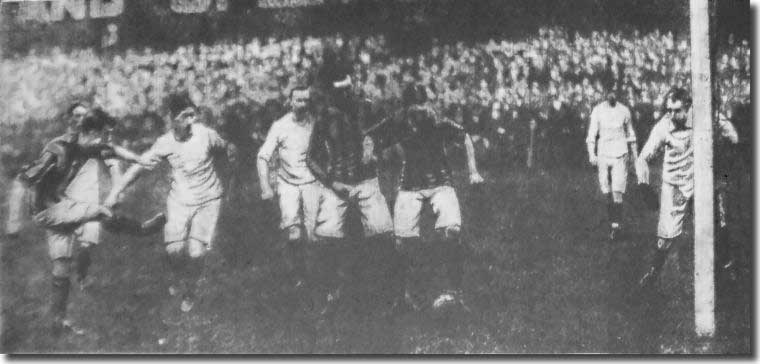 David
Murray had earlier suffered a nasty gash after a clash of heads, but soldiered
on for a while. Eventually, he had to leave the field, with City forced
to play the second half with just nine fit men.
David
Murray had earlier suffered a nasty gash after a clash of heads, but soldiered
on for a while. Eventually, he had to leave the field, with City forced
to play the second half with just nine fit men.
back to top
Leeds managed to prevent any further score until shortly after the hour
mark, when the floodgates opened. The Peacocks conceded a further three
goals before the conclusion, finishing on the wrong end of a 5-0 scoreline.
The team rallied the following week and won by the odd goal in five against
new League leaders Hull City. Leeds came back from 2-1 down to score twice
in the second half and register a thrilling victory. Stan Cubberley made
his first appearance of the season at inside-left, peppering up the front
line, but once more it was Fred Croot who took all the honours with a
splendid performance. He laid on goals for Bob Watson and Billy McLeod
and forced a penalty, though McLeod's spot kick was saved.
Croot was eminent in all that was good about City's play, and he had
sustained his form quite splendidly throughout this entire opening run
of games, while Tom Hynds continued to enhance his reputation with some
solid displays at centre-half.
Neither man was on form, though, on October 19 at Derby County as City
disintegrated in the face of some strong attacks, with Rams inside-left
Alf Bentley netting four times in a 6-1 debacle.
Goalkeeper Harry Bromage, an automatic choice since City were first elected
to the Second Division, was the scapegoat for two heavy defeats and was
summarily dropped to make way for Tom Naisby, freshly signed from Sunderland.
The Leeds Mercury reported: 'The Leeds City Selection Committee
have gradually been weeding out the players who were in at the formation
of the club. The latest to stand down is Bromage, whose place in goal
against Lincoln City at Elland Road is to be taken by Naisby of Sunderland,
who has just been secured for the club. Bromage seems to have been very
warmly peppered with shots in recent matches, and he has been unable to
stand the fire successfully. Even the greatest goalkeepers will break
down now and then. Perhaps the defence generally is capable of improvement.
Bromage, no doubt, envies Muir of Bradford City, who is fortunate in having
such strong backs and clever half-backs to take a lot of work out of his
hands.'
There was some controversy over the change, as Bromage was a popular
figure round Elland Road. The Mercury's Nimrod noted in his report
of Naisby's debut, a 2-1 win at home to Lincoln City, 'The critics certainly
looked forward to the appearance of Naisby in goal with some curiosity,
and there were those who would have quickly said bitter things at the
expense of the management for having the temerity to displace Bromage
had Naisby failed to make a satisfactory debut. Bromage's ability is well
known; he still has the skill, and one must sympathise with him on having
so many goals scored against him of late. But he is not primarily to blame,
for it must be borne in mind that the defence has not been above reproach,
particularly in the wing half-back positions, though the backs have not
been too steady. Naisby was fortunate in this respect on Saturday; he
was well supported by those in front of him.'
| |
Top of Division Two - 26 October 1907 |
| |
Pos
|
|
P
|
W
|
D
|
L
|
F
|
A
|
Pts
|
| |
1st
|
Hull
City |
11
|
8
|
0
|
3
|
21
|
10
|
16
|
| |
2nd
|
Leeds
City |
10
|
6
|
1
|
3
|
20
|
23
|
13
|
| |
3rd
|
Bradford
City |
8
|
5
|
2
|
1
|
26
|
5
|
12
|
| |
4th
|
Oldham
Athletic |
8
|
6
|
0
|
2
|
15
|
5
|
12
|
| |
5th
|
West
Brom Albion |
9
|
6
|
0
|
3
|
17
|
7
|
12
|
| |
6th
|
Leicester Fosse |
9
|
4
|
4
|
1
|
14
|
8
|
12
|
| |
7th
|
Fulham |
10
|
6
|
0
|
4
|
19
|
13
|
12
|
| |
|
|
|
|
|
|
|
|
|
The win, with first half goals from Parnell and McLeod, lifted City back
up to second in the table behind Hull City, but the team's form was definitely
on the slide. On the positive side, Naisby proved an outstanding replacement
for Bromage, Hynds and Croot continued their good work and Cubberley had
brought a desperately needed work ethic to the team, but all the hope
engendered by the first four games was fading rapidly.
The problem was that the rest of the side just could not maintain the
consistency that was needed to mount a serious challenge for promotion
- they could be brilliant one week and yet look like no hopers the next.
back to top
David Murray and Harry Kay were the regular partners at full-back but
left Naisby far too exposed far too many times, though Murray was the
sounder of the two men. A number of players had been tried at right-half,
but none had been entirely successful at the side of Hynds and Cubberley.
The real deficit, though, lay among the forwards where there were too
many chances missed after decent lead up play: 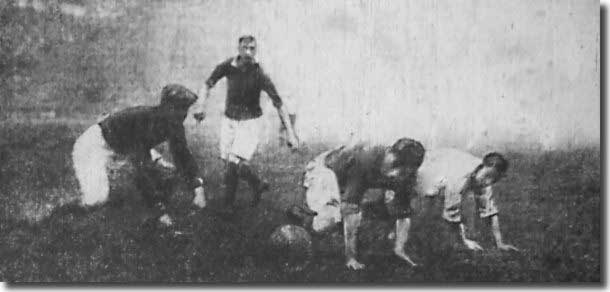 Parnell,
McLeod and Croot had played every game, with the other places being filled
by any two from Watson, Lavery and Thomas, but none of the combinations
had really set the world on fire. Croot was a constant inspiration on
the left flank, but he could not do it all on his own, and there was just
too much insipid play.
Parnell,
McLeod and Croot had played every game, with the other places being filled
by any two from Watson, Lavery and Thomas, but none of the combinations
had really set the world on fire. Croot was a constant inspiration on
the left flank, but he could not do it all on his own, and there was just
too much insipid play.
'Leeds City were very disappointing. They did not infuse into their play
the dash which has characterised their previous exhibitions. They were
too slow on the ball, and in this respect gave their opponents a great
advantage … The Leeds forwards were not great. One was always wanting
them to go ahead as if they had some powder behind them, but instead they
finessed and were robbed of the ball.'
The team went five games after the Lincoln victory without a win, and
their dreary run was extended to just a single success in nine by a drab
goalless draw at home to Gainsborough Trinity on December 28, City's final
game of 1907 - the team had now sunk to thirteenth spot and were left
sneaking edgy glances over their shoulders at the re-election zone.
It was an astonishing about turn in fortunes, which even the arrival
in November of Stoke inside-forward Jimmy Gemmell (who had won a league
championship medal with Sunderland in 1902) did nothing to improve. The
team had lost eight of their games away from Elland Road, and were becoming
an easy touch for even the lowliest opponents.
The home form was strong enough, though, and Wanderer wrote in frustration
in the Leeds Mercury after a 2-0 defeat away to Wolves on 21 December:
'Leeds City seem determined not to secure another victory away from home.
The only time they have notched two points on foreign soil this season
was on September 14th at Blackpool, and since then they have not brought
a point back to Leeds. And it is all the more aggravating when one takes
into account the form shown by the team on the Elland Road ground.
'One can call to mind many matches on that enclosure this season in which
the City team have been particularly brilliant. As recently as last week,
for instance, when Grimsby Town were so handsomely beaten, there was an
all round excellence in the home ranks, but a very different tale has
to be told of Saturday's match.
'The outstanding weakness of the team was the lack of combination. At
times the men seemed as if they could not put the ball in the right 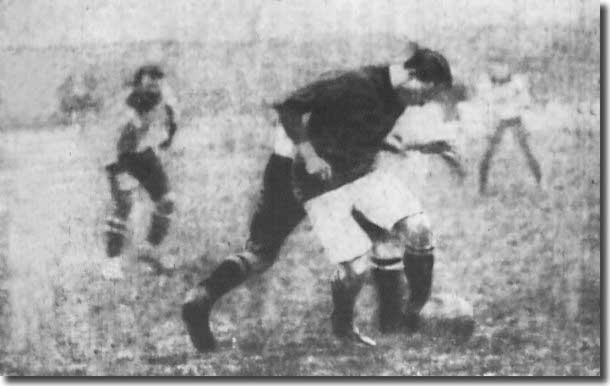 place,
and consequently countless opportunities were put in the way of their
opponents.'
place,
and consequently countless opportunities were put in the way of their
opponents.'
A season that had opened positively and promised so much was rapidly
turning into a nightmarish campaign to forget for manager Gilbert Gillies.
Something drastic needed to be done and very quickly.
Part 2 - Results
and table
Other Football Highlights from 1907/08
- Manchester United, in only their second season back in the top flight,
took Division One by storm. Their extraordinary 6-1 win over champions
Newcastle was their seventh out of 13 wins from their first fourteen
games as they built up a commanding lead at the top. They faltered in
the second half of the season, but such was their lead that they won
the title by nine points
- Newcastle appeared jinxed in the FA Cup with their 1908 final defeat
at the hands of Wolves at the Crystal Palace ground their third runners
up spot in four years
- Celtic repeated their Scottish league and Cup Double success
- England shared the Home International title with Scotland and played
their first full international on foreign soil on 6 June 1908, beating
Austria 6-1 in Vienna. Within a week, they repeated the dose - 11-1
this time - and then beat Hungary 7-0 and Bohemia 4-0
- Manchester United's Billy Meredith chaired the inaugural meeting of
the Players' Union on 2 December 1907 at the Imperial Hotel in Manchester
back to top












 with
most of the men who had featured in that run when they determined their
choice to open the new season.
with
most of the men who had featured in that run when they determined their
choice to open the new season. of the game was the poor display on the right wing by Parnell and Watson,
who generally prove so effective. True, Parnell scored the only goal -
the result of a neat bit of work; but with this exception, his play was
far from brilliant. Watson spoilt himself by sticking to the ball too
much. Time after time he would attempt to dribble past several of his
opponents when one of his colleagues was waiting for the ball. The back
division, too, was not as sound as one could have wished for.'
of the game was the poor display on the right wing by Parnell and Watson,
who generally prove so effective. True, Parnell scored the only goal -
the result of a neat bit of work; but with this exception, his play was
far from brilliant. Watson spoilt himself by sticking to the ball too
much. Time after time he would attempt to dribble past several of his
opponents when one of his colleagues was waiting for the ball. The back
division, too, was not as sound as one could have wished for.' David
Murray had earlier suffered a nasty gash after a clash of heads, but soldiered
on for a while. Eventually, he had to leave the field, with City forced
to play the second half with just nine fit men.
David
Murray had earlier suffered a nasty gash after a clash of heads, but soldiered
on for a while. Eventually, he had to leave the field, with City forced
to play the second half with just nine fit men. Parnell,
McLeod and Croot had played every game, with the other places being filled
by any two from Watson, Lavery and Thomas, but none of the combinations
had really set the world on fire. Croot was a constant inspiration on
the left flank, but he could not do it all on his own, and there was just
too much insipid play.
Parnell,
McLeod and Croot had played every game, with the other places being filled
by any two from Watson, Lavery and Thomas, but none of the combinations
had really set the world on fire. Croot was a constant inspiration on
the left flank, but he could not do it all on his own, and there was just
too much insipid play. place,
and consequently countless opportunities were put in the way of their
opponents.'
place,
and consequently countless opportunities were put in the way of their
opponents.'